|
|
|
Sort Order |
|
|
|
Items / Page
|
|
|
|
|
|
|
| Srl | Item |
| 1 |
ID:
133232


|
|
|
|
|
| Publication |
2014.
|
| Summary/Abstract |
Attitudes to quangos are paradoxical. On the one hand they are perceived to be undemocratic, unaccountable organisations, while on the other they are seen to improve effectiveness, limit political interference and increase public confidence in government. This paradox is reflected in the behaviour of political parties, which generally adopt a harsh line towards quangos in opposition, but come to rely on these bodies in office. Ahead of the 2010 general election it was, however, noticeable that the Conservative party rejected this dynamic by promising to pursue 'a more sophisticated approach'. This article explores the Coalition government's subsequent 'public bodies reform programme', assessing its progress against recommendations contained within the Institute for Government's Read before Burning report of July 2010. It concludes that while the Coalition has addressed long-standing concerns about the day-to-day governance of public bodies, it has failed to resolve a set of broader and strategic (metagovernance) issues.
|
|
|
|
|
|
|
|
|
|
|
|
|
|
|
|
| 2 |
ID:
139425
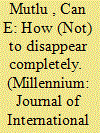

|
|
|
|
|
| Summary/Abstract |
The question of research methods, and their role in the field, is a major source of contention for IR scholars. We can, however, discuss method, methodology, and innovation without revising or revisiting old debates. Methods do not have to be divisive, or disciplining. A frank discussion of research design, methods, and methodological preferences is essential to innovation and reproducibility. This intervention is a call for increased transparency in IR research outputs; IR theorists should not erase their own footprints from their publications and openly admit and discuss failures as productive moments in research. The act of disappearing, which has become the norm in the name of professionalised publications, robs the field of the productive pedagogical potential of research methods. The true impact of research rests in its pedagogical potential. As researchers, our job is thus to find a sensitive balance between not determining the outcome of the research from the get-go by making it all about our preferences and opinions, but also not making the impact of our preferences and opinions disappear completely. Building on this premise, this intervention discusses the significant pedagogical potential of research methods, reproducibility and discussion of failures in International Relations.
|
|
|
|
|
|
|
|
|
|
|
|
|
|
|
|
| 3 |
ID:
173165
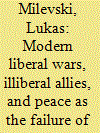

|
|
|
|
|
| Summary/Abstract |
The post-Cold War period nearly up to the present has been characterised as the age of liberal wars, yet key facets of the liberal guidance of war remain under appreciated. This article seeks to address this wider gap with regard to the particular concern of war termination and the fulfilment or failure of policy. First, it develops characterisations of liberal wars based on the existing literature, identifying three broad types through consideration of context—defensive versus offensive—and of political and strategic agency, particularly regarding the motives for and intents of action. Three types of liberal wars result: defensive liberal wars, offensive liberal wars with humanitarian motive and geopolitical intent, and offensive liberal wars with geopolitical motive and humanitarian intent. The article then presents one exemplary case for each liberal war with an emphasis on how liberal strategy required an illiberal ally and that ally's effect on the subsequent peace.
|
|
|
|
|
|
|
|
|
|
|
|
|
|
|
|
| 4 |
ID:
174048
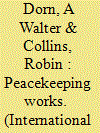

|
|
|
|
|
| Summary/Abstract |
Despite some harsh criticisms of United Nations (UN) peace operations, research demonstrates that many UN missions are successful, though evaluations depend on how success is defined. Even UN missions that fail in one or more aspects provide a net benefit to peace processes and help to save lives and alleviate human suffering. While an understanding of the flaws and limitations of peace operations can help improve the operations, some unfair criticism must be directly challenged. For instance, contrary to critiques in a recent paper by Séverine Autesserre, the UN has helped end civil wars, and it does not have a fixation on elections nor does it ignore the bottom-up approach. Most UN multidimensional missions pursue multiple levels of engagement, from local to national leaders. Elections are a key way to engage locals. With decades of experience, the UN has many positive lessons to offer in making, keeping, and building peace.
|
|
|
|
|
|
|
|
|
|
|
|
|
|
|
|
| 5 |
ID:
176494
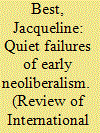

|
|
|
|
|
| Summary/Abstract |
While the last few decades of political economic history give the impression that the logic of neoliberalism is inexorable, this article argues that once we look further backwards and dig into recently declassified archives documenting the early days of neoliberal theory and practice, we find a messier picture. Economic policymakers in Thatcher and Reagan's administrations in the early 1980s did not set out to ‘fail forwards’ by generating a crisis that would enable a statist kind of neoliberalism. The key ideas that they drew on and the policies that they used to put them into practice sought to transform the economy indirectly, through a set of performative policy devices that they believed would generate a dramatic shift in people's inflationary expectations, lowering inflation without provoking a major recession. Archival records make it clear that these efforts were not only a failure, but also one that policymakers were acutely aware of at the time. By examining these quiet failures in economic policy, we can better understand how these governments simultaneously failed in their early efforts to introduce neoliberal economics and yet ultimately succeeded in transforming their economies in important respects – and in legitimising those transformations by narrating failure as a kind of inevitable success.
|
|
|
|
|
|
|
|
|
|
|
|
|
|
|
|
| 6 |
ID:
189467
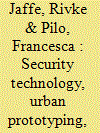

|
|
|
|
|
| Summary/Abstract |
In response to broader political and corporate tendencies towards ‘techno-solutionism’, critical studies of security technology highlight the threat that security technologies pose to civil rights and democratic accountability. This article argues for a slightly different perspective: rather than taking claims of technological efficacy at face value, it explores the multiple ways in which security-related technology so frequently fails to deliver its – confidently anticipated or feared – effects. A focus on sociotechnical failure can offer more comprehensive, on-the-ground understanding of the technopolitics of security. We suggest that these politics may lie precisely in the blurring of concepts of failure and success, as ‘prototyping’ and experimentation become an increasingly powerful logic of urban governance. This argument is developed through an analysis of security interventions in Jamaica, a context characterized by high levels of violent crime. The article focuses on three technologies that have been adapted to security-related purposes: a communication channel connecting police and private security guards, a public–private CCTV network, and a smart electricity grid. Drawing on approaches from science and technology studies, the article adopts a process-oriented approach, attending to both the discourses surrounding the introduction of these technologies and their everyday interactions with their social and built environments.
|
|
|
|
|
|
|
|
|
|
|
|
|
|
|
|
| 7 |
ID:
095642


|
|
|
|
|
| Publication |
2010.
|
| Summary/Abstract |
Instead of always teaching students how to succeed-as is the norm in higher education-it might also be useful to teach them about failure. Understanding failure (that is, why actors fail to reach common objectives in inter-group settings) gives students deeper insight into how to resolve global problems, and the conditions under which success can be achieved. This enhances student awareness of complexity in world affairs, including the nature of inter-group relations. Simulations are a good way to teach students about the possibility of failure, and how to learn from it, because they allow students to go through the learning process on their own. In this article I discuss how a simulation I ran on Middle Eastern politics can be used as an example of how to instruct students about failure as much as about success.
|
|
|
|
|
|
|
|
|
|
|
|
|
|
|
|
| 8 |
ID:
151290


|
|
|
| 9 |
ID:
134358


|
|
|
|
|
| Summary/Abstract |
This paper examines the downfall of the Séléka rebellion, which staged a coup in the Central African Republic in March 2013. The coup plunged the country into violence and chaos, and there has been an uneasy quest for peace ever since. This article explains why the leader of the rebellion lost control over his troops and was finally pushed by regional actors to leave power. The article concludes that the Séléka rebellion was already fragile and, together with the poor leadership demonstrated by the coalition leader, the rebellion was unable to hold on to power.
|
|
|
|
|
|
|
|
|
|
|
|
|
|
|
|
|
|
|
|
|